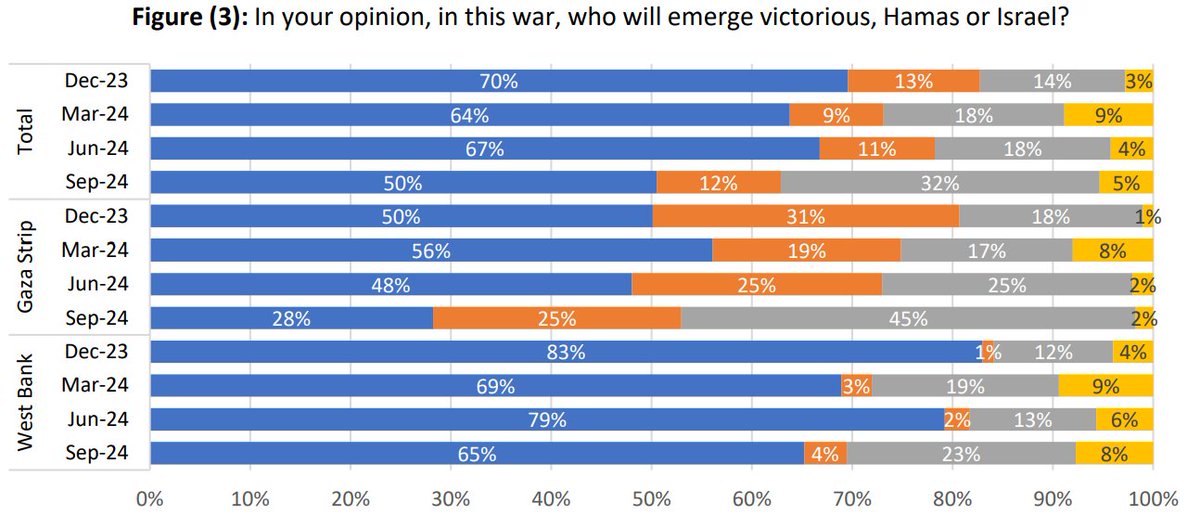Four days ago, a new PCPSR poll came out about Palestinian public opinion about the war and some surrounding questions. The results are dramatic; I'll touch some of the highlights here and will draw some conclusions. Here's the poll itself. /1 pcpsr.org/sites/default/…
Almost a year into the war, support for the Oct 7 attack is at a record low in the Gaza Strip: a mere 39%. Down from 59% in Dec and 71% in March. Recall that diplomatic pressure on Israel peaked around March-April. West Bankers are also sobering up, although much more slowly. /2 

Perhaps needless to emphasize, but doesn't hurt to, that no moral reckoning took place in the Gazan population. 89% still believe that Hamas members didn't commit atrocities against Israeli civilians. Their enthusiasm for the massacre dropped because it backfired *at them*. /3 

A record low share of Gazans, only 28%, believe now that Hamas will win the war (down from 56% in March and 48 in June). Almost the same share, 25%, believe that Israel will win the war. West Bankers are still optimistic (65%), though not as much as in the past. /4 

Only 37% of Gazans believe that Hamas will be in power in the Gaza Strip after the war, down from 46% three months ago. An almost identical 36% said they'd prefer Hamas to rule the Strip (also down from 46%). Perhaps for the first time in history, Hamas is genuinely unpopular. /5 

As we can see from the quoted passage, Hamas remains popular in the West Bank, where 73% want to see it stay in power and 70% expect it to after the war. Gazans have intense buyers' regret, while their brethren in the West keep cheering for the people who destroy their lives. /6
Sinwar is even less popular in the Gaza Strip: only 29% of Gazans have a positive view of him, although 70% of West Bankers do. I must say, the chasm between the West Bank and the Gaza Strip never ceases to amaze me. West Bankers show the attitudes of unempathetic diasporoids. /7 

Interestingly, Iran and Hezbollah also dropped in popularity. They peaked in June, I presume after Iran's large drone and rocket attack on Israel, and it dropped again by September, probably due to Iran's lack of response to Haniye's assassination. Yemen is the most popular. /8 

Election polls show similar results. The Sinwar/Haniye slate (I guess this was asked before the latter was assassinated) gets a record low of 26% in the Gaza Strip; a record high, 33%, say they wouldn't vote. However, in the West Bank Sinwar/Haniye are at a record *high*. /9 

Support for the two-state solution rose modestly in both the Gaza Strip and the West Bank. In the Gaza Strip it's shown as higher only in March. I said when I wrote about this and I repeat it now: I think the March result of 62% was a polling error back then. /10 

Support for armed struggle is at a record low in the Gaza Strip since the beginning of the war (36%), while support for negotiations is at a record high (40%). In the West Bank, public support for neither has changed much since the beginning of the war. /11 

We can draw a few conclusions.
First: while Gazans displayed more dovish views than West Bankers since the outbreak of the war, the gap widened over the past few months and by now became dramatic. Not only materially, but mentally too, they now live in parallel realities. /12
First: while Gazans displayed more dovish views than West Bankers since the outbreak of the war, the gap widened over the past few months and by now became dramatic. Not only materially, but mentally too, they now live in parallel realities. /12
There's something deeply ironic about this, since one of Hamas's goals was to unite the Palestinian people, including Israeli Arabs. This attempt utterly failed, especially when we also take Israeli Arabs into consideration (on which I touched here). /13
https://x.com/HeTows/status/1835398944399991269
Second: I said this previously, but I think these polls are a great way to test rival hypotheses about Palestinian psychology. Does military pressure curb the appetite for violence, or does it just radicalize them? For each terrorist eliminated, do we create three more? /14
The answer is pretty clear: Israel's willingness to enter a long war, and its refusal to cave to diplomatic pressure, curbed rather than inflamed Palestinians' appetite for terrorism - *but only in the Gaza Strip, where they were directly affected by the military response*. /15
Palestinians in the West Bank are unfazed, as extreme as ever, and somewhat amazingly, the suffering of their close relatives in the Strip causes zero reflection in them. You would expect they are able to learn from the mistakes of Gazans, but apparently this is not the case. /16
To my mind, this means that an Intifada in the West Bank is almost unavoidable. West Bankers have been watching this war from the sidelines, saw what Gazans brought on themselves by bringing Hamas to power, and they thought: "this is great, we want to try the same thing". /17 

I'll close by answering the rhetorical question so often posed by Western leftists: for each terrorist you kill, how many new ones do you create?
We can now give an empirically informed answer.
In the Gaza Strip, less than one.
In the West Bank, it makes no difference. /18-end
We can now give an empirically informed answer.
In the Gaza Strip, less than one.
In the West Bank, it makes no difference. /18-end
• • •
Missing some Tweet in this thread? You can try to
force a refresh




